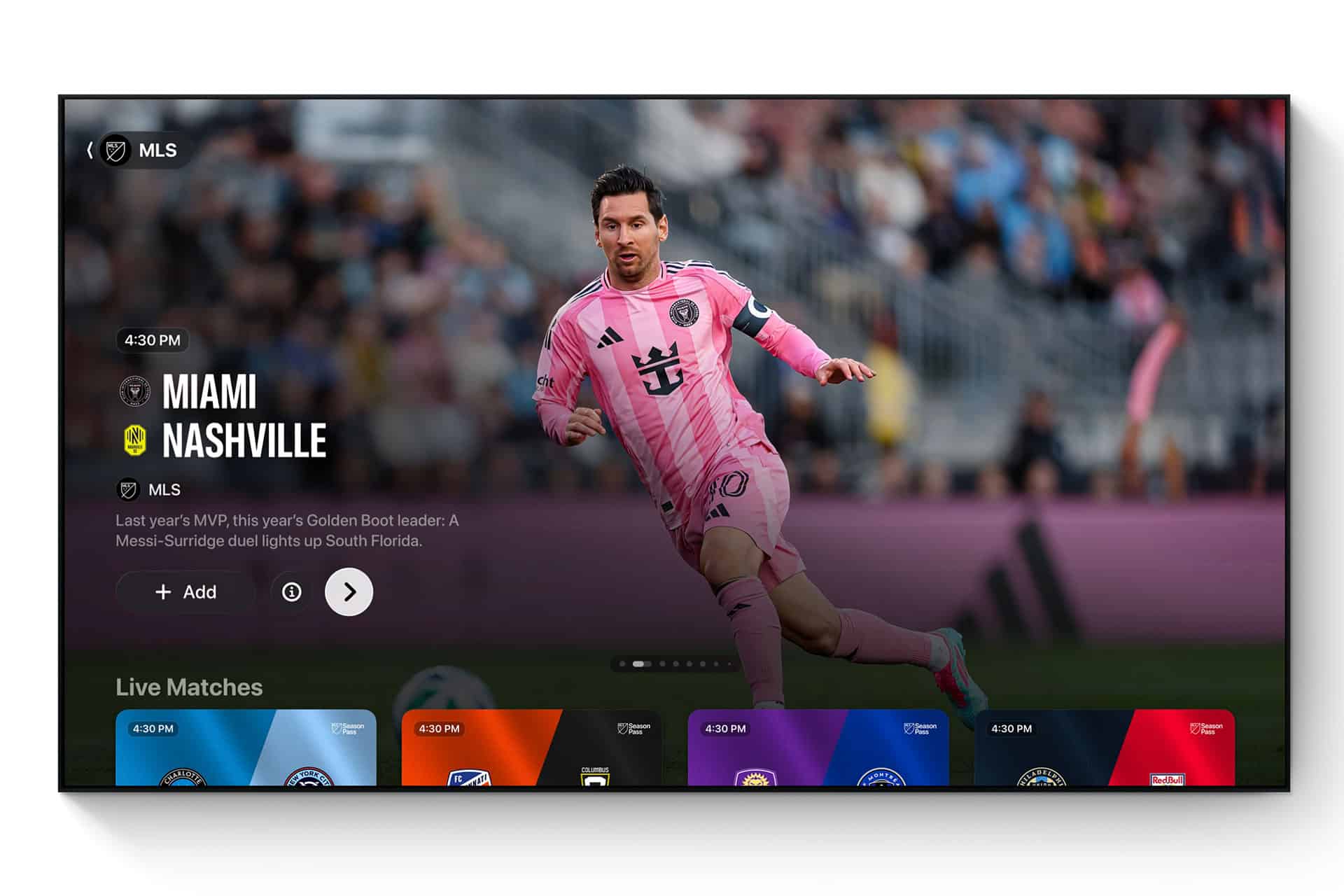Apple is expanding access to its Major League Soccer coverage by opening all MLS playoff matches to Apple TV subscribers, even those without an MLS Season Pass. The move marks a notable shift in Apple’s sports streaming strategy, broadening the tournament’s audience as North American soccer gains traction ahead of the 2026 FIFA World Cup.
The offer began this week as the MLS postseason kicked off, allowing millions of Apple TV users to watch playoff fixtures directly within the Apple TV app. The company described it as an opportunity to “bring the excitement of playoff soccer to more fans than ever,” while reinforcing Apple’s long-term partnership with the league.
When Apple first signed its ten-year global streaming deal with Major League Soccer in 2023, it committed to building a dedicated sports ecosystem within its entertainment platform. The exclusive partnership, valued at $2.5 billion, made Apple the worldwide home of every MLS match through the MLS Season Pass, available as a separate subscription.
This new playoff access represents the first time Apple has lifted that paywall, signaling an effort to grow engagement during the league’s most watched phase of the year. By allowing Apple TV subscribers to stream postseason matches, the company is effectively turning the playoffs into a showcase for its broader sports offering — a marketing move designed to convert new fans into long-term subscribers for Season Pass.
Industry observers view the decision as a low-risk, high-visibility strategy. With interest in soccer rising across North America, particularly as the United States, Mexico, and Canada prepare to co-host the 2026 World Cup, Apple is positioning itself at the center of that momentum.

Apple TV Live Sports
Apple’s experiment with MLS has evolved into one of its most ambitious ventures beyond scripted entertainment. Since the launch of MLS Season Pass, the company has applied its design philosophy to sports streaming — emphasizing real-time analytics, multilingual commentary, and seamless cross-device viewing.
Making playoff matches available to the broader Apple TV base expands the ecosystem further, blurring the line between sports coverage and traditional streaming. The integration allows users to move effortlessly between scripted content like Ted Lasso and live sports without leaving Apple’s platform — a level of convenience that reinforces the company’s push toward bundled entertainment experiences.
The approach mirrors Apple’s gradual expansion into live events. Alongside MLS, the company has experimented with select live music streams and sports documentaries, developing a portfolio that complements its scripted shows rather than competing directly with traditional broadcasters.
A Boost for Major League Soccer
For MLS, the partnership has delivered global exposure unlike any previous deal. Matches are now available in over 100 countries, with production handled under Apple’s supervision to ensure consistent quality and multilingual support.
Opening playoff matches to Apple TV subscribers further amplifies that visibility. The move could attract casual fans who may not have purchased a separate sports subscription but remain curious about the league’s postseason excitement. It also aligns with MLS’s efforts to grow its international following and highlight its top players ahead of 2026, when global attention will turn to North America’s role as host of the World Cup.
Apple’s collaboration with the league extends beyond broadcast rights. The two organizations continue to co-develop behind-the-scenes content, interactive stats overlays, and exclusive interviews — features that enhance the storytelling around matches and deepen user engagement.

A Unified Sports Platform
Apple’s decision to make playoff matches more accessible also reflects its long-term goal of creating a unified sports destination inside Apple TV. The platform already integrates live data from various leagues, dynamic widgets for team tracking, and push notifications for game schedules.
By blending entertainment and live sports under one ecosystem, Apple differentiates itself from traditional streaming rivals. The company’s emphasis on curation — offering fewer but higher-quality partnerships — contrasts with the scattershot licensing approach typical of larger media networks.
This curated model helps maintain brand consistency while giving Apple leverage in negotiating future sports rights. With its technology infrastructure already proven through MLS, analysts expect Apple to pursue additional deals, potentially in motorsports or international football leagues.
Early reactions to the open-access playoff initiative have been positive, with viewers praising the seamless streaming quality and accessibility within the Apple TV interface. The integration of live match highlights and recaps alongside regular Apple Originals creates a cohesive experience that invites discovery.
If engagement metrics meet expectations, Apple could consider expanding similar promotions for other major MLS events, including next season’s All-Star Game or the Leagues Cup. For now, the playoffs serve as a high-profile test case — one that showcases Apple’s capability to balance exclusivity with accessibility in its evolving media strategy.
As Apple continues blending entertainment and live experiences, its collaboration with Major League Soccer remains central to its broader vision: turning Apple TV from a streaming service into a complete cultural platform, where sport, storytelling, and technology converge.














